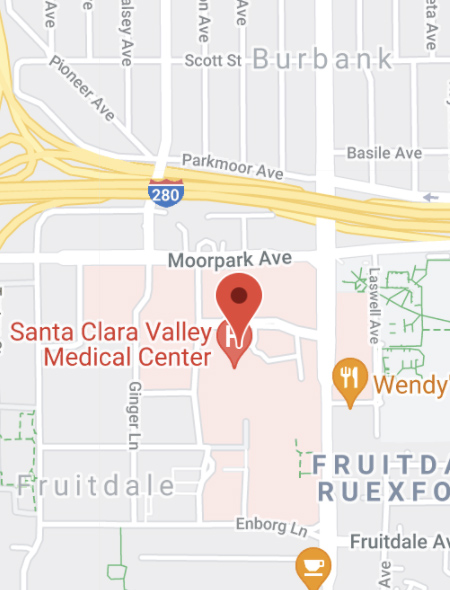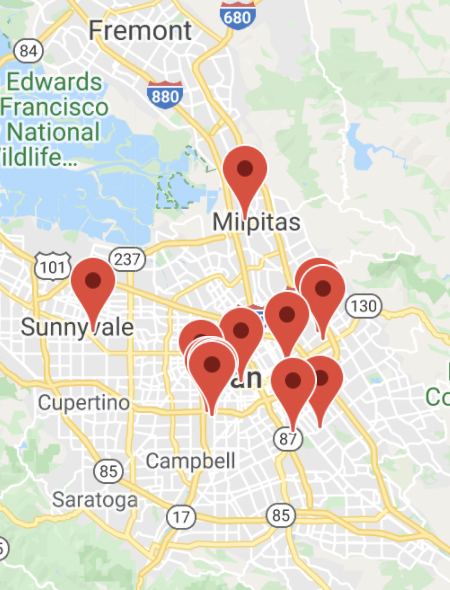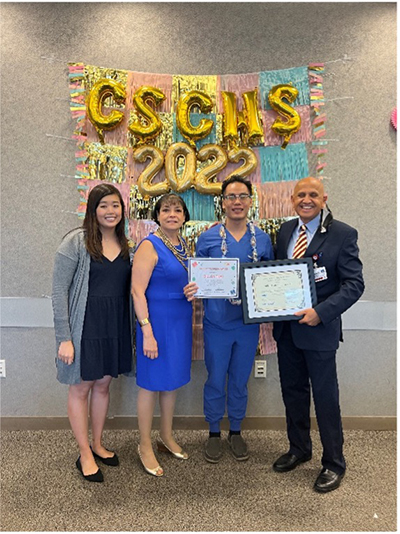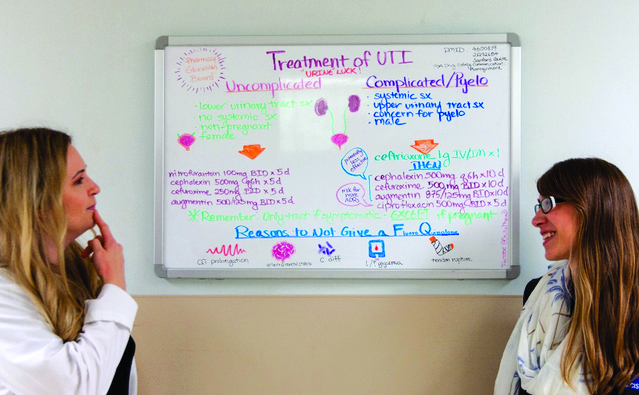Pharmacy Residency
PGY2 Infectious Diseases Pharmacy Residency
The PGY2 Infectious Diseases Residency Program welcomed its first resident in 2021 and received full accreditation by the American Society of Health-System Pharmacists (ASHP) in 2022
The Residency Program Coordinator is Michelle Ito, PharmD, BCACP.
For 2024-25, the program will be on hold.
PGY2 INFECTIOUS DISEASES PHARMACY RESIDENCY PROGRAM
Our PGY2 Infectious Diseases (ID) Pharmacy Residency is a one-year postgraduate specialty training program that offers residents an immersive experience in all aspects related to ID pharmacy after they have completed a PGY1 residency.
The program has 3 major goals: 1) develop the resident into a strong antimicrobial steward; 2) gain experience in providing care to diverse population needing specialized infectious diseases and antimicrobial management; and 3) enhance knowledge, skills and attitudes of a strong preceptor. Residents will become fully integrated into the antimicrobial stewardship program (ASP) team and infectious diseases department to manage the ASP service as well as assist ID providers with complex pharmaceutical regimens. Additionally, they will be expected to complete quality improvement projects, and gain experience in inpatient pharmacy leadership, including committee work and precepting activities.
Residents will complete training in pharmacy operations, required core rotations, and multiple elective rotations during the 12-month residency program. Our program partners with Stanford Hospital & Clinics to potentially offer one elective rotation to the ID pharmacy resident. The rationale for selecting the required rotations is to comply with ASHP standards and ensure that residents will acquire the necessary clinical skills to become effective practitioners of the future. Residents are encouraged to select elective rotations that match their individual preferences, and which build upon past experiences. Required rotations and elective rotations are highlighted below.
Program Structure
- 2 weeks Residency Orientation
- 3 weeks Inpatient Staffing Training (duration may be altered depending on resident’s previous experience)
- 26 weeks of core (required) patient care learning experiences
- 19 weeks of elective patient care learning experiences.
- 2 weeks (10 days) of project days
- Required longitudinal learning experiences include:
- Anti-infective Evaluation Subcommittee (and designated workgroups)
- Staffing
- Teaching certificate (if did not complete previous certificate, see below)
- Residency Project & Publication
Core (required) Learning Experiences
- Microbiology (2 weeks)
- Administration (2 weeks)
- MICU (5 weeks)
- ASP I (4 weeks)
- ASP II (4 weeks)
- ASP III – Teaching (6 weeks)
- ID Consult (3 weeks)
- HIV/ID Clinic (longitudinal)
- Antimicrobial Stewardship Workgroup and/or Diagnostic Stewardship Workgroup (longitudinal)
- Inpatient Staffing (longitudinal)
- Teaching certificate (if did not complete previous certificate) (longitudinal)
- Residency Project (longitudinal)
- Continuing Education (longitudinal)
Elective Learning Experiences
- Infectious Diseases Consult Service (repeated)
- Community Hospital ASP Service*
- Emergency Medicine
- Internal Medicine
- Hematology/Oncology (inpatient)
- Public Health Clinic
- Stanford Hospital & Clinics elective
*Completed at O’Connor and/or St. Louise Regional Hospitals
At the completion of the PGY2 Infectious Diseases Pharmacy Residency, the resident will possess the skills necessary to run an antimicrobial stewardship program and assist with management of infectious diseases and antimicrobial therapy for both inpatient and outpatient settings, and will be prepared to work in clinical, teaching, and leadership roles.
RESIDENCY ACTIVITIES
RESEARCH PROJECTS
Each PGY2 resident will be required to design and write a research proposal. If IRB (Institutional Board Review) approval is required, the resident will be required to present during the IRB meeting. The primary focus of the research project will be ID-related, such as a quality improvement project or cost savings analysis. The Residency Program Coordinator and Residency Project Sponsor will guide the resident throughout the year with possibility of presenting the research at the Western States Regional Residency Conference or another conference affiliated with a pharmacy or infectious diseases organization (ex. ACCP Annual, IDWeek). Residents will prepare a project manuscript and may submit for publication in a peer-reviewed journal.
TEACHING
Our institution is affiliated with a variety of pharmacy schools. Dozens of pharmacy students per academic year complete their clinical clerkship rotations (APPEs) within our institution, thus providing the resident many opportunities to precept pharmacy students. We also have an expanding PGY1 program. PGY2 infectious diseases residents will assist pharmacists in precepting students and PGY1 residents during their rotations. Additionally, our institution is a certified provider of continuing education for pharmacists; the PGY2 resident will be asked to present a continuing education program during the year.
All residents are invited to participate in the University of Pacific-Santa Clara Valley Medical Center (UOP-SCVMC) Teaching Certificate Program, which is focused primarily on teaching in a preceptor setting. Residents will improve their teaching skills through a variety of activities such as precepting pharmacy students/residents, participation in inter-professional activities, and participation in monthly teaching seminars. Upon completion of the program pharmacy residents will be issued a teaching certificate plaque by the University of the Pacific-San Jose Region. The program is optional for PGY2 residents who already have a teaching certificate from their PGY1 program, but required for those who have not completed a precepting-focused teaching certificate.
PHARMACY OPERATIONS/STAFFING
Residents will be required to staff approximately 4-6 days per month in the inpatient setting (including the intensive care units, MedSurg floors, etc.) or related to antimicrobial stewardship related services. Staffing requirements are subject to change.
COMMITTEE WORK
As part of the longitudinal administration learning experience, residents will be required to attend the anti-infective evaluation subcommittee (AES) meetings. The resident must present and complete at least two projects to the subcommittee or affiliated workgroups (antimicrobial stewardship or diagnostics stewardship) Projects may include developing clinical policies/protocols/guidelines, performing a medication utilization review, and creating or updating electronic medical record configurations.
REGIONAL AND NATIONAL CONFERENCES
In November, residents may attend the California Society of Health-System Pharmacists (CSHP) Seminar, an annual four-day meeting where residents showcase their institution’s residency program to prospective applicants and have an opportunity to attend continuing education programs and develop networking connections.
In December, the American Society of Health-System Pharmacists (ASHP) Annual Midyear Meeting provides similar benefits to that of the CSHP meeting, except on a broader scale, as this is a national conference.
Additional conferences to present the results of research may include ACCP Annual, IDWeek, or SIDP Annual. In May, the resident will be encouraged to attend and present their research results at the Western States Residency Conference.
Attending all conferences are optional. The residency program reimburses residents for at least 50% of registration costs and provides a competitive salary for travel and hotel costs; however, the program will not reimburse for airfare or hotel. Conference attendance requirements and reimbursements are subject to change.
QUALIFICATIONS FOR ACCEPTANCE
ALL APPLICANTS MUST FULFILL THE FOLLOWING CRITERIA IN ORDER TO QUALIFY FOR ACCEPTANCE INTO THE PGY2 INFECTIOUS DISEASES PHARMACY RESIDENCY PROGRAM:
- PharmD degree from an ACPE-accredited school of pharmacy
- Completion of an ASHP-accredited PGY1 pharmacy residency program or one in the ASHP accreditation process (i.e. – Candidate Status)
- Eligible for licensure in the state of California
- Demonstrate eligibility to work in the United States
- Favorable recommendation letters from clinical facility and/or former employers
- Demonstrate collegiality, clinical knowledge, interest in research, and motivation necessary for successful completion of residency training
- Completion of an interview with residency program coordinator, residency program director, director of pharmacy services, and preceptors
APPLICATION PROCESS
FOR ANY QUESTIONS, ALL INTERESTED APPLICANTS SHOULD CONTACT:
Michelle Ito, PharmD, BCACP
Residency Program Coordinator
[email protected]
The PGY2 Infectious Diseases Pharmacy Residency participates in the ASHP Residency Match Program.
NATIONAL MATCHING SERVICES (NMS) CODE: 626955
THE FOLLOWING DOCUMENTS WILL BE REQUIRED OF ALL PROSPECTIVE APPLICANTS TO COMPLETE THE APPLICATION PROCESS (ALL SUBMITTED VIA PHORCAS):
- General PhORCAS application (including letter of intent)
- Curriculum Vitae
- Three references from clinical faculty and/or former employers. At least two of the three letters of reference must be from your PGY1 program. No supplemental letters are necessary; reference writers only need to fill out the PhORCAS reference form.
- Supplemental attachments to be submitted via PhORCAS:
- A sample of your written work (e.g. publication, monograph, drug utilization review, etc).
The deadline to submit the documents via PhORCAS is: N/A
Thank you for your interest in our program!





